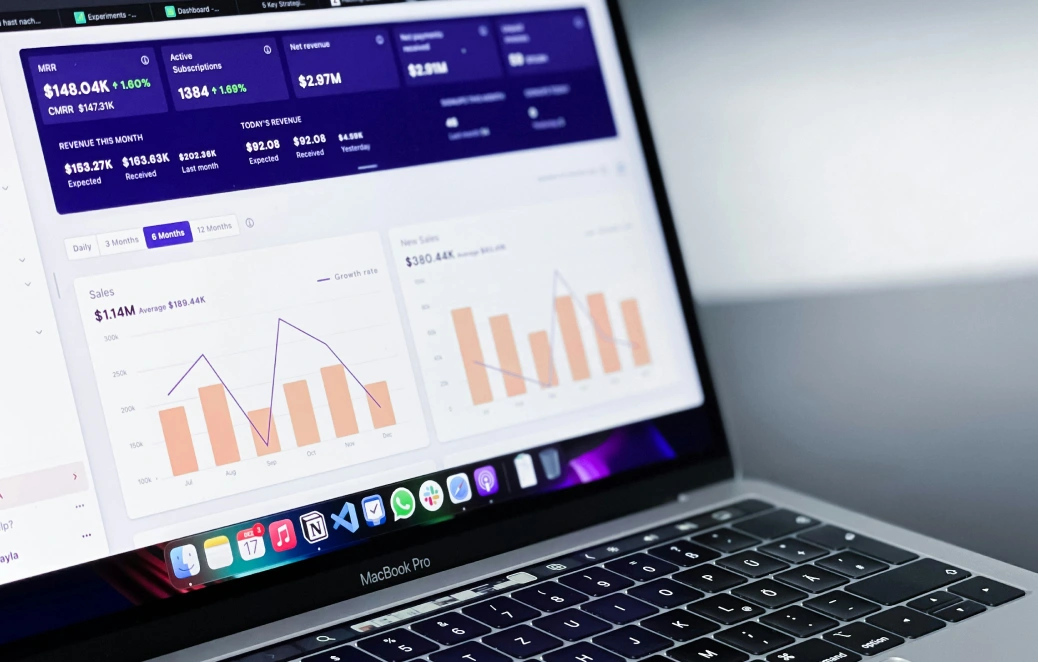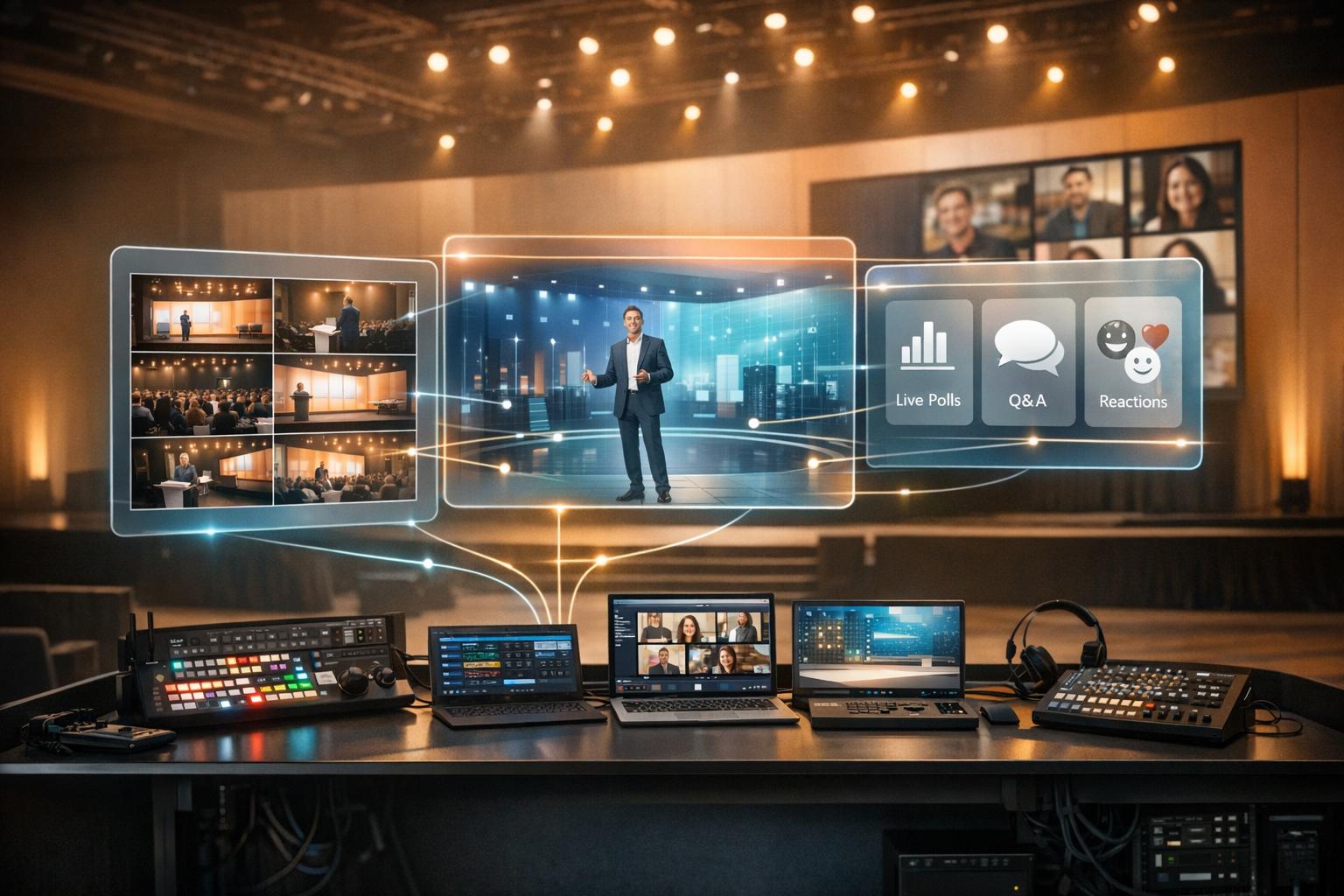AI Tools for Sustainable Event Planning

Chief Executive Officer

AI is transforming event planning by making it faster, more efficient, and eco-friendly. From picking venues with green certifications to reducing waste through digital marketing, AI tools simplify complex tasks while aligning with environmental goals. Here's how AI is reshaping the industry:
- Venue Selection: AI analyzes energy use, waste management, and transit access to recommend eco-friendly venues.
- Logistics: AI optimizes transportation by suggesting carpooling, public transit, and low-emission travel options.
- Digital Marketing: AI replaces printed materials with tailored, digital-first campaigns, cutting costs and waste.
- Real-Time Monitoring: AI tracks resources like energy and waste during events, enabling on-the-spot adjustments.
- Cost Savings: AI platforms can reduce planning costs by up to 98%, making green events accessible to all budgets.
Companies like Corporate Optics are already using AI to improve event services while meeting eco-conscious goals. These tools not only simplify planning but also help organizations meet sustainability targets efficiently.
From Vision to Venue: How AI Is Transforming Event Planning
Using AI for Green Venue Selection
Choosing a venue isn’t just about cost and capacity anymore - it’s also about minimizing environmental impact. AI-driven platforms are stepping in to simplify what used to be a time-consuming process of manual research.
While traditional venue selection focuses on straightforward factors like price and size, sustainable event planning requires a more detailed dive into data. Digital tools now gather information from sustainability reports and certifications, giving planners a clear picture of key factors like energy efficiency, waste management practices, and accessibility to public transportation. It’s worth noting that these platforms don’t create environmental metrics themselves; instead, they rely on verified data and expert assessments to provide reliable insights.
Let’s break down how AI processes and compares this crucial information.
How AI Evaluates Venue Environmental Metrics
AI tools pull together data on energy usage, waste management, and transportation options to create a snapshot of a venue’s environmental performance. This helps planners quickly identify venues that align with sustainability goals, while still leaving room for expert reviews to dig deeper into the details.
After assessing venues for their environmental practices, AI goes a step further by integrating cost analysis, balancing financial and sustainability considerations to refine the selection process.
Real-Time Cost and Environmental Comparisons
Modern platforms offer dynamic comparisons, allowing planners to weigh costs against sustainability metrics in real time. These tools make it easy to model different scenarios, showing how choices impact both budgets and environmental outcomes. For example, a venue with higher upfront costs might deliver long-term savings through better energy efficiency or easier access to public transportation.
Corporate Optics takes this process to the next level by incorporating advanced digital tools into their event planning services. Their approach combines technical know-how with cutting-edge technology, ensuring venues meet both logistical and sustainability standards seamlessly.
AI-Powered Solutions for Green Event Logistics
After choosing a venue that prioritizes sustainability, the next step is managing event logistics in a way that aligns with eco-conscious goals. This is where AI steps in, offering smart, data-driven solutions to streamline and green the process.
Optimizing Transportation and Travel
Transportation is often a major contributor to an event's carbon footprint, but AI can help tackle this challenge head-on. By analyzing attendee locations, travel habits, and local transit options, AI tools can recommend greener travel solutions. These platforms can pinpoint clusters of attendees and suggest carpooling arrangements or group transportation options. They also evaluate public transit routes, walking distances from transit stops, and even nearby bike-sharing programs to encourage low-emission travel.
What makes these tools even more effective is their ability to process complex variables. Advanced algorithms take into account traffic patterns, fuel efficiency, and time-of-day variations, helping to minimize emissions. They also model different scenarios, showing the financial and environmental impact of each strategy. This level of precision makes it easier to choose options that are both cost-effective and eco-friendly.
sbb-itb-ae35a94
AI for Green Event Marketing and Engagement
Digital marketing is reshaping event planning by significantly reducing waste. Traditional paper-heavy methods, like printed brochures and schedules, often result in unnecessary environmental strain. AI-driven platforms are stepping in to replace these outdated practices with digital-first strategies that are both efficient and eco-conscious.
Creating Eco-Friendly Marketing Campaigns
AI is changing the game for event planners by offering tools that create and distribute digital marketing materials. Instead of relying on printed brochures and information packets, advanced AI models can generate digital content that’s not only more engaging but also tailored to individual audiences. This shift eliminates the need for physical printing, cutting costs and reducing waste.
Platforms like prompts.ai make these capabilities accessible with affordable monthly plans, often saving planners thousands of dollars in printing expenses for larger events. Tools like AI Image Studio take it a step further by producing photorealistic visuals, eliminating the need for physical mock-ups, posters, or elaborate printed designs. These visuals can be used across digital formats, from social media graphics to email campaigns and digital signage. Automated workflows further simplify campaign management, reducing the time and effort required for execution.
But AI’s impact doesn’t stop at marketing - it also enhances how attendees interact with events.
AI-Powered Attendee Engagement Tools
Building on the eco-friendly approach to marketing, AI-powered engagement tools offer seamless, paperless interactions for event attendees. Virtual assistants and chatbots provide instant support, share event information, and even collect feedback in real-time. These tools can deliver schedule updates, speaker details, and venue directions directly to attendees’ devices, making printed materials virtually unnecessary.
Corporate Optics, a leader in technical event production and AV solutions, illustrates how AI can be integrated into every stage of event planning. As a partner of prompts.ai, they use AI tools to enhance audiovisual design, streamline event workflows, and analyze post-event data. This approach allows them to deliver high-quality experiences for corporate, lifestyle, sporting, and government events while embracing a digital-first mindset.
The effectiveness of these tools is reflected in prompts.ai’s impressive 4.8/5 user rating. Franck Buscemi, CEO & CCO, highlights the value of AI in event planning, stating:
"Streamline content creation, automate strategic workflows and empower his team to focus on big picture vision, while retaining their creative edge."
This balance between automation and creativity allows event teams to focus on strategy and relationship-building while AI handles repetitive tasks. Beyond saving paper, these digital tools also reduce waste from overproduced materials, making events not just smarter but greener.
Using AI for Real-Time Event Environmental Management
Once you've optimized venue selection, transportation, and digital engagement, real-time environmental management ties everything together. AI-driven tools now play a key role in making events more eco-friendly by delivering live data and actionable insights during the event itself. These tools help organizers keep an eye on important environmental factors, enabling better decisions as the event unfolds.
Real-Time Data Tracking for Environmental Goals
AI-powered platforms are changing the game when it comes to real-time environmental monitoring. These systems can track metrics like energy consumption and waste production in real time, giving event teams a clear picture of their sustainability performance as it happens. With this immediate feedback, organizers can tweak resource usage on the fly to meet their environmental goals.
To make the most of this technology, it’s important to set clear sustainability targets from the beginning. The data collected during the event not only helps in the moment but also feeds into post-event analysis, ensuring every event builds on the lessons of the last.
Post-Event Analytics for Continuous Improvement
The story doesn’t end when the event wraps up. Post-event analytics take the data collected during the event and transform it into insights for future planning. By analyzing this information, planners can see what worked, identify areas for improvement, and adjust their strategies for more sustainable practices next time.
Over time, reviewing historical data helps uncover trends and refine approaches, making each event a stepping stone toward more eco-conscious planning. This cycle of constant learning and improvement empowers organizers to develop strategies that are not just effective for one event but sustainable in the long run.
The Future of Green Event Planning with AI
Sustainable event planning is entering a transformative phase as AI technology becomes more advanced and accessible. This shift is fundamentally changing how organizations approach eco-friendly events, making them more efficient and achievable for a broader range of budgets.
AI platforms are already delivering impressive results, cutting costs by as much as 98% and boosting productivity by up to 10 times, which means sustainable events are no longer reserved for organizations with deep pockets. With over 35 unified AI models available, planners can now compare various strategies and make well-informed decisions to enhance their sustainability efforts. As AI continues to evolve, these tools will only become more powerful, driving even greater efficiency and impact.
The future also promises deeper integration between AI and event operations. Companies like Corporate Optics are pioneering methods that embed AI insights into every stage of event planning. This approach ensures that sustainable strategies are not just theoretical but are actively applied in real-world scenarios. AI’s ability to adapt to real-time challenges makes it an indispensable tool for turning green initiatives into practical, actionable solutions.
One of the most exciting aspects of AI in event planning is its scalability. Small organizations, which previously lacked the resources for sophisticated sustainable events, can now execute plans that rival those of large corporations with dedicated sustainability teams. This democratization of resources is leveling the playing field, enabling businesses of all sizes to contribute meaningfully to environmental goals.
AI also gets smarter with every event. By analyzing historical data, these systems continuously refine their recommendations, making each event more efficient and environmentally friendly than the last. Organizations that adopt AI now are setting themselves up to lead in an industry where sustainability isn’t just an option - it’s becoming the norm.
FAQs
How can AI tools help ensure event venues meet sustainability goals while balancing cost and accessibility?
AI tools like prompts.ai are transforming how venues are chosen by evaluating key sustainability factors like energy efficiency, waste management practices, and certifications such as LEED. These platforms simplify the decision-making process by combining sustainability insights with essential criteria like budget, location, and accessibility.
With the help of AI, event planners can make smarter choices that align with environmental priorities while meeting logistical requirements. Corporate Optics, a partner of prompts.ai, takes this a step further by incorporating these tools into their comprehensive event planning services, ensuring events are both responsible and well-executed.
How can AI-driven logistics tools help lower the environmental impact of event transportation and travel?
AI-powered logistics tools play a key role in reducing the environmental footprint of events by streamlining transportation and travel arrangements. For instance, they can recommend venues that are closer to most attendees, cutting down on the need for long-distance travel. These tools can also encourage eco-conscious choices, such as carpooling, using public transit, or even attending virtually, all of which help lower emissions.
By utilizing platforms such as prompts.ai, Corporate Optics ensures event production is not only efficient but also mindful of sustainability, integrating smarter planning and execution at every step.
What long-term advantages can organizations gain by using AI to enhance sustainability in event planning?
Adopting AI-powered practices in event planning can bring a host of long-term advantages for organizations. By using AI tools, businesses can simplify complex tasks like choosing the right venue, managing logistics, and optimizing resources. This not only boosts efficiency but also helps minimize the environmental footprint of events.
AI can also take over repetitive tasks, freeing up time and enhancing productivity across teams. In the long run, this approach allows companies to expand their operations more smoothly while staying aligned with their sustainability objectives. It’s a smart way to combine growth with eco-conscious planning.
Related Blog Posts









